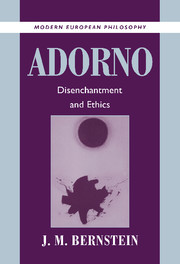Book contents
- Frontmatter
- Contents
- Preface
- List of Abbreviations
- Introduction
- 1 “Wrong Life Cannot Be Lived Rightly”
- 2 Disenchantment: The Skepticism of Enlightened Reason
- 3 The Instrumentality of Moral Reason
- 4 Mastered by Nature: Abstraction, Independence, and the Simple Concept
- 5 Interlude: Three Versions of Modernity
- 6 Disenchanting Identity: The Complex Concept
- 7 Toward an Ethic of Nonidentity
- 8 “After Auschwitz”
- 9 Ethical Modernism
- Index
5 - Interlude: Three Versions of Modernity
Published online by Cambridge University Press: 05 June 2012
- Frontmatter
- Contents
- Preface
- List of Abbreviations
- Introduction
- 1 “Wrong Life Cannot Be Lived Rightly”
- 2 Disenchantment: The Skepticism of Enlightened Reason
- 3 The Instrumentality of Moral Reason
- 4 Mastered by Nature: Abstraction, Independence, and the Simple Concept
- 5 Interlude: Three Versions of Modernity
- 6 Disenchanting Identity: The Complex Concept
- 7 Toward an Ethic of Nonidentity
- 8 “After Auschwitz”
- 9 Ethical Modernism
- Index
Summary
Although the whole impetus of Adorno's thought is to raise the possibility and rational necessity for a radical transformation of modernity, he nowhere provides a philosophical analysis of modernity in the sense of how modernity is to be distinguished from and is an achievement with respect to what preceded it. So, on the one hand, Adorno is engaging in a critique of modernity, and presupposes that no philosophical thinking can be legitimate unless it is elaborated in relation to the characteristic institutions and practices of the modern world; on the other hand, he nowhere offers an explicit account of the modern world in its self-conscious differentiation of itself from the theological and metaphysical past. Yet this reluctance to provide an affirmative account of modernity must trouble his critical strategy since in its naturalistic and genealogical aspects it conflicts with the strong conception (s) of modernity in Kant, Hegel, and, to a certain degree, Marx. I think the best one can do here is to say that although Adorno does possess an affirmative conception of modernity that implicitly results from his critical endeavors, from immanent critique, it is equally plausible, and almost certainly necessary, to see him as presupposing this affirmative account.
Nonetheless, the reason he remains sanguine, even oblivious, to this question is that the critical object of his thinking is, in a curious way, distinct from the implied and presupposed affirmative account of modernity.
- Type
- Chapter
- Information
- AdornoDisenchantment and Ethics, pp. 235 - 262Publisher: Cambridge University PressPrint publication year: 2001

